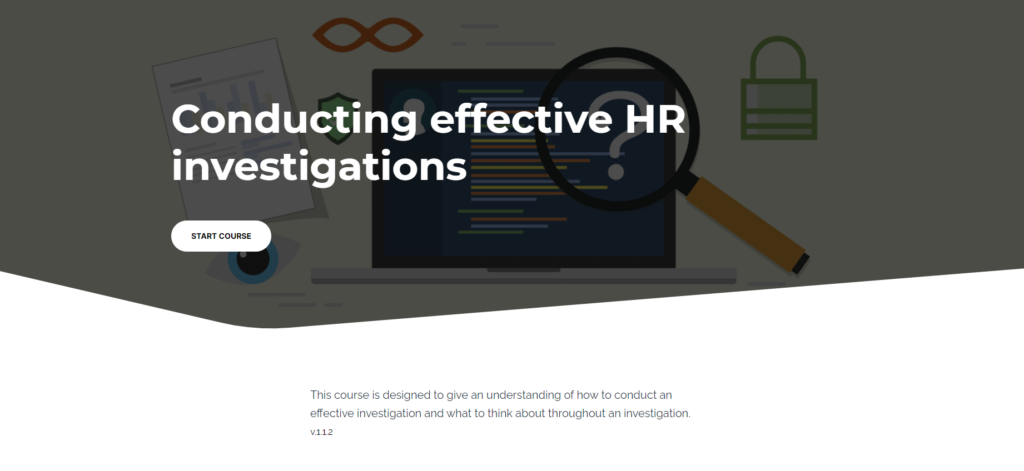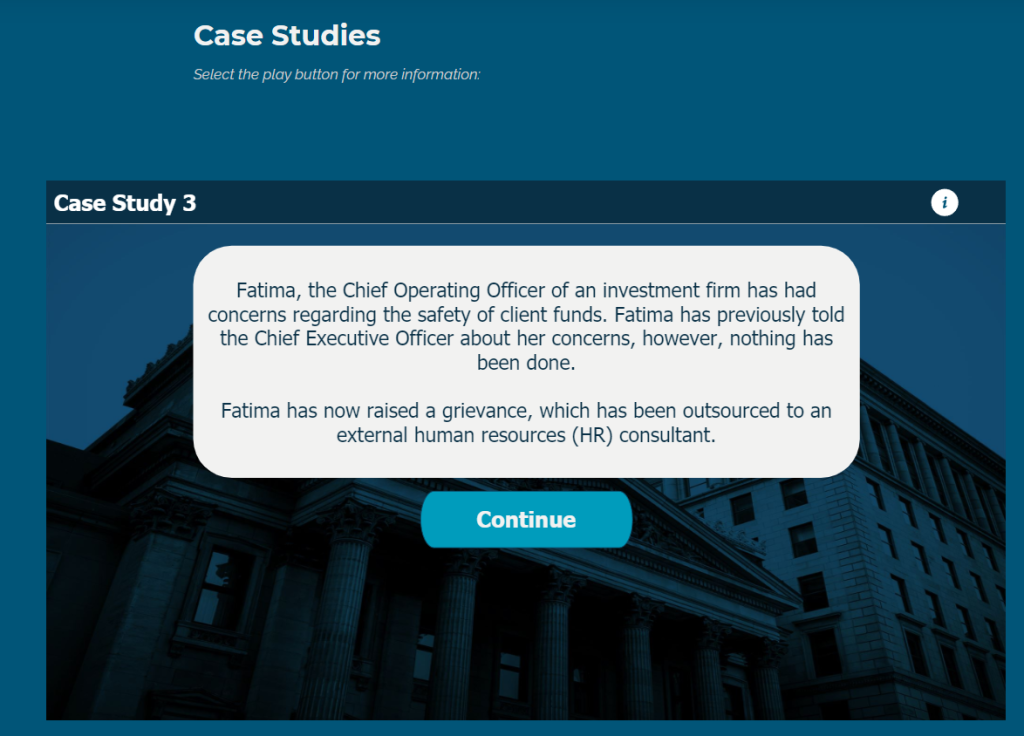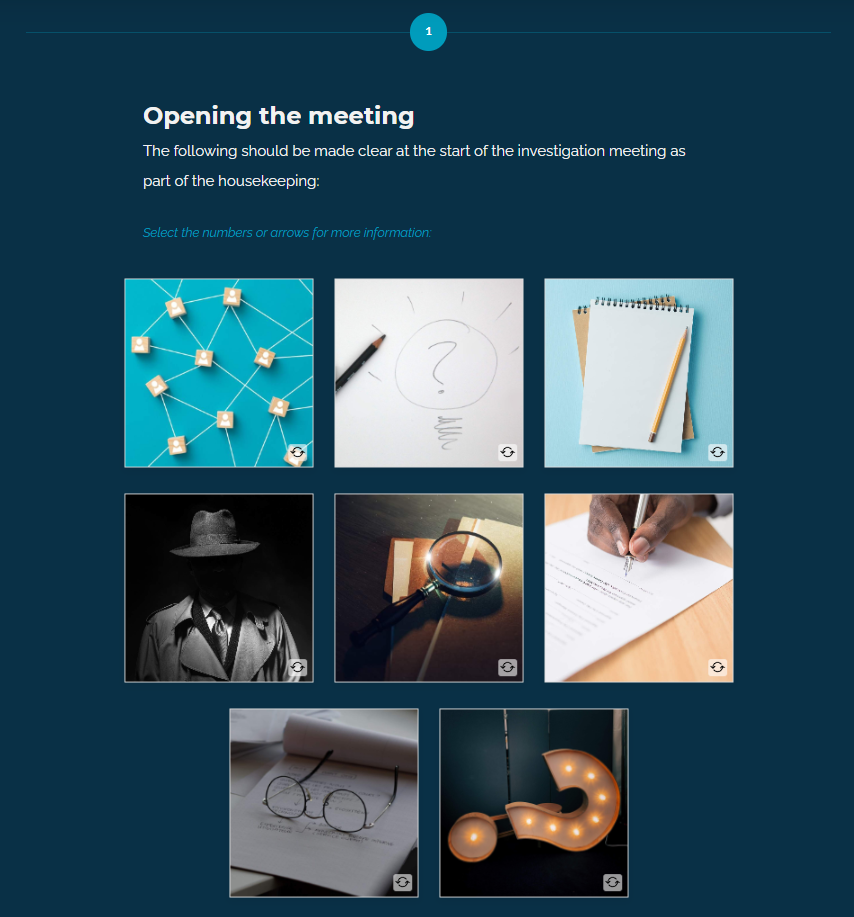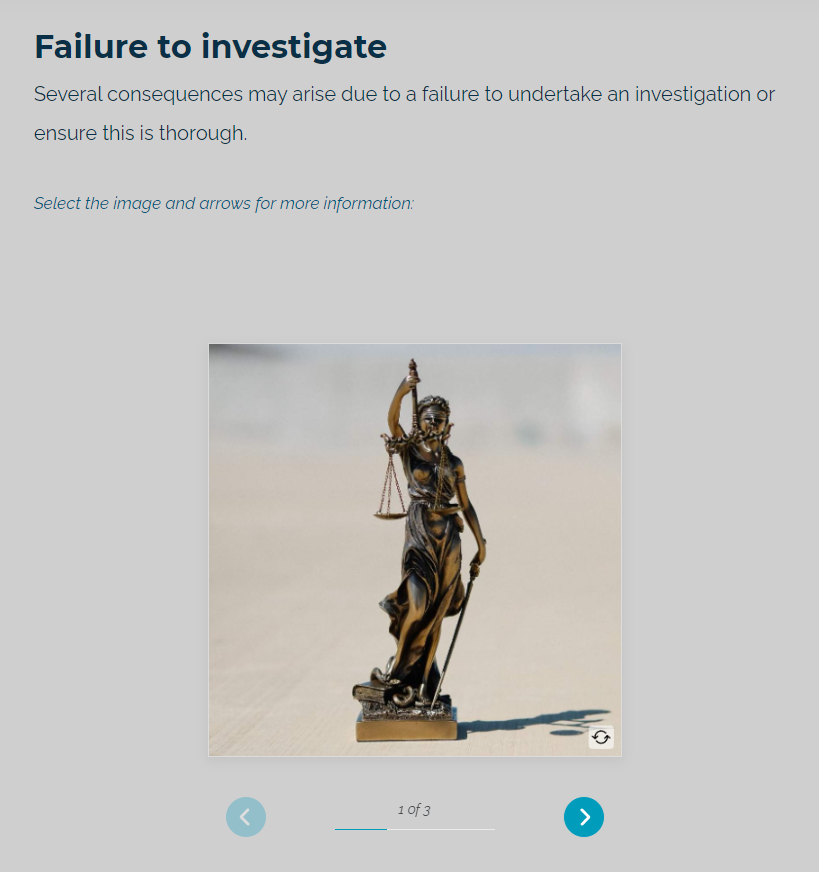HR Investigation Training
HR investigation training provides participants with the skills to manage workplace disputes professionally.
Employers are responsible for ensuring the correct policies, procedures and training are in place to prevent allegations surrounding the fairness and credibility of an HR investigation.
This course is designed to give a thorough understanding of how to plan, conduct and follow up an investigation and what to consider throughout the process.
Want to find out more information on our ‘HR Investigations Training’ course?

HR Investigation Training
HR investigation training covers how to plan, conduct and follow up an investigation in line with best practices, and what to consider throughout the process.
£25
Complete the form below to discuss multi-licence discounts with our team.

What are the benefits of our HR Investigation training course?
- Provides a thorough understanding of how to conduct fair, efficient HR investigations that follow best practice.
- Develops skills in gathering evidence, reporting findings and following up on findings.
- IOSH Approved, CPD Certified and SCORM Compliant training.
- Online course can be completed at the employee’s own pace.
- Interactive training to keep participants engaged throughout.
- Multiple choice quizzes so participants can check their understanding as they go.
- Summaries at the end of each section to enhance understanding.
Course duration
HR investigation training for employees takes approximately 25-30 minutes to complete.
Who should take this course?
Our HR Investigations training is designed for managers. It is also a useful refresher for HR professionals.
You do not need any previous or specialist knowledge to take this course.
Course accreditations

Our accreditations mean you can be confident that we deliver high-quality, effective eLearning that forms part of a professional development programme.
We pride ourselves on our extensive certification and accreditation. We’re CPD Certified and this course is SCORM compliant which means it can be integrated as part of your existing LMS or used as part of our SHINE learning management system.
Learn more about our health and safety accreditations.
HR Investigation FAQs
Do you have to carry out an investigation before a disciplinary?
Before a disciplinary is carried out an employer must investigate what has happened. This is likely to involve and investigation meeting.
What is an example of a leading question in an investigation?
A leading question guides the respondent towards a specific response rather than allowing them to provide an unprompted answer. Here’s an example of a leading question:
“You were aware that missing the deadline by taking a three-hour lunch break would jeopardize the entire project, weren’t you?”
Can the same person carry out an investigation and disciplinary?
The same person should not carry out an investigation and disciplinary. It is important to choose different people, so the process is as impartial and fair as possible.
What is an unfair workplace investigation?
An unfair workplace investigation is a biased and incomplete process that lacks transparency and objectivity. The investigator may have preconceived notions or a conflict of interest, undermining the fairness of the entire procedure.
Key witnesses may be overlooked or ignored, and the person under investigation might not be given a fair chance to present their version of events.
Evidence may be selectively gathered to support a predetermined outcome, rather than to uncover the truth.
The findings might not be communicated transparently, and there may be no avenue for appeal or further review.
Start your learning adventure
Created by experts. IOSH Approved. CPD Certified. Our fire, health and safety courses support your compliance training needs. We offer flexible eLearning options. Buy individual courses now and start learning. Or simply call us to discuss group discounts and enterprise pricing options.
Buy now – individual course
- Fully interactive – online learning
- Certified training – created by experts
- Perfect for smaller businesses and sole traders starting out
Call us – volume discount
- Save money – volume discounts
- Control – central dashboard
- Reporting – monitor training progress
- Ideal for mid-sized SMEs needing to deploy training at scale
Call us – Enterprise pricing
- Bespoke – tailored to your needs
- Comprehensive – over 50 courses
- Support – 1-2-1 account management
- Perfect for larger businesses needing a wide variety of training
Assessment
At the end of employment investigation training there are 10 multiple choice questions to answer, and the pass mark is 80%.
Certificate
If you complete the HR investigation course on SHINE, you will receive a certificate on successful completion of the course which is downloadable as a PDF file.
Course aims
By the end of the HR investigations course, participants will:
- Understand when to investigate and who should carry out an employment investigation.
- Have a clear understanding of each step of the investigation process.
- Know how to plan and prepare for an investigation.
- Have the skills to gather accurate evidence.
- Know what action to take following an investigation.
Course Overview
1. What is an investigation?
An introduction to what an HR investigation is and who should understand the process. The importance of having a clear policy and procedure in place.
The purpose of an investigation and the difference between formal and informal investigations.
2. When should you investigate?
The circumstances under which to investigate.
How to stay up to date with guidance on best practices for carrying out employment investigations.
3. What is the six-step investigation process?
An overview of the six-step investigation process:
- Initial organisational considerations
- Investigator’s preparation
- Investigation meeting
- Gathering evidence
- Reporting findings
- Procedures following an investigation.
4. Step 1: Initial organisational considerations
How to decide whether an investigation should be formal or informal and how to ensure confidentiality is maintained.
How to choose an appropriate investigating officer.
5. Step 2: Investigator’s preparation
What to consider in a pre-investigation plan, including the organisation’s policies and procedures. The importance of establishing a clear purpose for an investigation.
How to decide what evidence is needed for the investigation including evidence from witnesses.
Considering the timescale of an investigation and other factors like how the meeting will be recorded, where it will take place, and who else will be present.
What practical steps to take before an informal investigation takes place and the best practices to follow if an employee is suspended.
What procedures to follow if investigating a grievance.
6. Step 3: Investigation meeting
Understanding the 5 main aspects of an investigation meeting: preparation, opening the meeting, during the meeting, at the end of the meeting, and after the meeting.
What each of the 5 main steps involves, what practical actions to take for each step, key considerations and best practice tips.
How to carry out effective investigations through different questioning styles and what types of questions to avoid. How to communicate to ensure the information gathered is as accurate and relevant as possible.
7. Step 4: Gathering evidence
The types of evidence that may be collected for investigations and how to assess the evidence.
8. Step 5: Reporting the findings
What reports the investigating officer needs to produce to support their recommendations. What types of actions an investigating officer can recommend.
Who must make the final decision about how the matter should progress.
9. Step 6: After the investigation
What factors will inform the steps to take following an investigation.
What happens in the event of an appeal.
Considering the types of changes that may need to be made following an investigation, for example, reasonable adjustments.
10. What if…?
This part of the course helps participants to prepare for the circumstances and questions that may arise as part of an investigation process.
- What to do if an employee is absent from an investigation meeting.
- The difference between an investigation meeting and a disciplinary meeting and the importance of separating the two.
- Whether an employee is entitled to be accompanied to an investigation meeting.
- Who can be an investigating officer.
- What happens if an investigating officer requires advice from a third party.
- The procedures to follow if an employee being investigated wants to raise a grievance.
- The possible consequences of failing to carry out an investigation.
Course screenshots
Fully interactive. Clear and simple. Created by experts.



How is it delivered?
HR investigation training is delivered online or through a computer network to each trainee at their desktop, laptop or mobile device.
We can also provide the course to be integrated into a SCORM compliant LMS.
Training can be completed at the employee’s own pace by “bookmarking” and recording progress and returning to the training later.
SHINE – compliance record keeping
The Praxis42 Digital Platform SHINE is our advanced eLearning management system and helps organisations deliver effective online learning for their employees.
A cost-effective tool for compliance record-keeping, SHINE allows you to view and manage employee training records easily. Individual training certificates can be printed as proof of compliance for audits or visits from enforcing agencies.
Related courses
Need further safety courses? Explore similar courses from our library.

What our clients say
From national pub chains to global insurance, our clients value our expertise and service.
HR Investigation Training – Download course information





